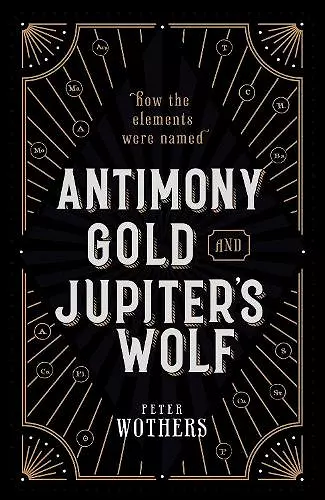Antimony, Gold, and Jupiter's Wolf
How the elements were named
Format:Hardback
Publisher:Oxford University Press
Published:28th Nov '19
Currently unavailable, and unfortunately no date known when it will be back

The iconic Periodic Table of the Elements is now in its most satisfyingly elegant form. This is because all the 'gaps' corresponding to missing elements in the seventh row, or period, have recently been filled and the elements named. But where do these names come from? For some, usually the most recent, the origins are quite obvious, but in others - even well-known elements such as oxygen or nitrogen - the roots are less clear. Here, Peter Wothers explores the fascinating and often surprising stories behind how the chemical elements received their names. Delving back in time to explore the history and gradual development of chemistry, he sifts through medieval manuscripts for clues to the stories surrounding the discovery of the elements, showing how they were first encountered or created, and how they were used in everyday lives. As he reveals, the oldest-known elements were often associated with astronomical bodies, and connections with the heavens influenced the naming of a number of elements. Following this, a number of elements, including hydrogen and oxygen, were named during the great reform of chemistry, set amidst the French Revolution. While some of the origins of the names were controversial (and indeed incorrect - some saying, for instance, that oxygen might be literally taken to mean 'the son of a vinegar merchant'), they have nonetheless influenced language used around the world to this very day. Throughout, Wothers delights in dusting off the original sources, and bringing to light the astonishing, the unusual, and the downright weird origins behind the names of the elements so familiar to us today.
[An] enchanting, eccentric book ... wickedly entertaining. * Simon Ings, The Spectator *
Such a book could only have been written by an academic deeply learned and passionate about chemistry ... it is also the kind of book whose title might pique someone's interest in a bookshop and inspire a lifelong passion for chemistry and its history ... it seems worth celebrating that some academics are still producing books so curious, wide-ranging and enthusiastic. * Matthew Reisz, The Times Higher Education Supplement *
[An] erudite, complex, but always enjoyably unbuttoned account of how the elements acquired their names. A charming way to convey the history of this science. * New Scientist *
In this stimulating chemical chronicle, Peter Wothers unravels tangled etymologies. * Barabara Keiser, Nature *
Wothers book is an enjoyable read for anyone interested in chemistrys history - and especially for anyone with an interest in why we chemists use the words we do. * Brett F. Thornton, Nature Reviews Chemistry *
It is immediately clear that a phenomenal amount of research has gone into [the book]. The author's own passion for chemistry's history is evident, through references to a huge variety of (al)chemical texts... The book is well paced and clearly organised, and definitely accessible to chemists and non-chemists alike... The rich tapestry of overlapping and interconnected stories means that any reader will come away with renewed appreciation of the art and artifice of our chemistry. * Philip Broadwith, Chemistry World *
Thorough and well-researched exploration of how the elements were named ... Readers even casually interested in the history of chemistry would do well to pick up this energetic survey. * Publishers Weekly *
Antimony, Gold, and Jupiter's Wolf unfolds as a series of more-or-less separate and chronological stories ... this makes it easy for a reader to easily dip in at any point ... lively volume. * Nicola Pohl, Science *
Wothers takes us through these mysterious chemical treatments and discoveries with the ease of a practiced writer. The amount of information he reveals is astounding and also often entertaining. * Gerrard Russell, Magonia Review *
Detailed and thorough ... A well-written reference book on history of science for the enthusiast, connoisseur or professional. * Cosette Molijn, NRC Handelsblad *
Peter Wothers combines history of science, the study of the origin of the names of the elements and general chemical revelations in his elemental tour, which proved delightful. * Brian Clegg, Popular Science blog *
A timely study of the chemical elements ... Wothers has included a great deal of material in his book, and any chemist interested in the history of his subject will enjoy it. Some will wish to read it from cover to cover, while others will dip into it for information on particular elements. * John Hudson, RSC Historical Group Newsletter *
This erudite yet accessible and entertaining account describes the challenges, confusions, illuminations, and jealousies involved in the naming of the underlying fabric of the everyday world. Anyone who enjoys the practice of science will be enriched by what they will read here. * Peter Atkins, University of Oxford *
Everything is here: from making phosphorus out of faeces all the way to superheavy elements, illuminated by a delightful combination of chemical insight and historical knowledge. * Martyn Poliakoff *
ISBN: 9780199652723
Dimensions: 241mm x 161mm x 29mm
Weight: 498g
290 pages